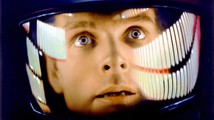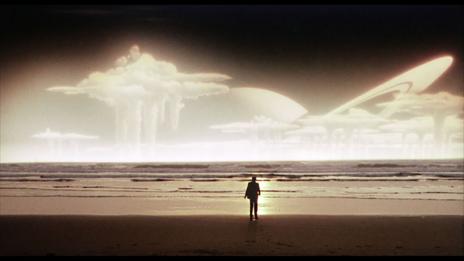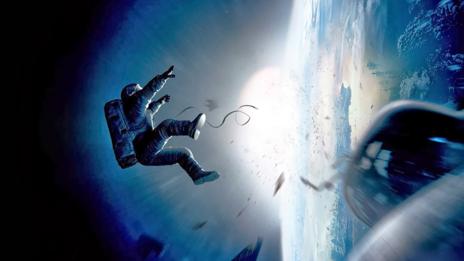/ News

Why is science fiction so hard to define?
Time Out, the weekly listings magazine, recently ranked the 100 best sci-fi movies of all time. They did it by polling 150 “leading sci-fi experts, filmmakers, science fiction writers, film critics and scientists” and getting them to each provide their 10 favourites.
As lists go it’s a decent one. It’s hard for me to take issue with a top three of 2001: A Space Odyssey, Blade Runner and Alien. Especially as my not-quite-four-year-old is named Hal partly after the homicidal computer in 2001. If we’d had a girl it was toss-up between Pris and Ripley.
Once you begin to get away from the top though, things soon get less clear cut. With only 150 people voting, some of the films near the bottom of the chart will only have had a vote or two, so if you’d asked different “leading” figures you’d have likely got different results. Last month, Neil deGrasse Tyson, astrophysicist and presenter of the revamped version of Cosmos, gave the LA Times his top 10 SF films which included four (Deep Impact, Watchmen, The Quiet Earth and The Island), which are not to be found anywhere in the Time Out’s list.

New Zealand's The Quiet Earth (1985) is a post-apocalyptic film about three people who survive a mysterious disaster (Cinepro)
Similarly my own shortlist has quite a few films on it that failed to make their top 100, including Rise of the Planet of the Apes, Back to the Future II, the original Godzilla, This Island Earth, Existenz, Bill & Ted’s Excellent Adventure and Dr Strangelove.
Dr Strangelove? How could something so often cited as one of the greatest films of any genre fail to make it into a sci-fi top 100 list? Simple, some will say: it’s not there because it’s not science fiction. But what most people would describe as being a black comedy or a Cold War satire, Dr Strangelove also does what the best science fiction always does. It makes us think about the possibilities and limitations of our species, and our relationship with science and technology. In this case nuclear Armageddon, and the likelihood then (and to an only slightly lesser extent now) of resisting our ability to blow ourselves to smithereens.
I’d say that makes it more a proper slice of science fiction than even some of the highest-rated films in the Time Out list. Terry Gilliam’s Brazil – their number seven – is my all-time favourite film (or at least it is most days) but I don’t think there’s much science amid the dystopian fantasy. Go one place higher – and for all its spaceships and robots and aliens, Star Wars is essentially a hi-tech fairy tale, with Luke Skywalker a space-faring Harry Potter figure using the magic of the force to battle evil Darth Voldemort.

Multi-Oscar-winner Gravity makes it on to the list - even though its own director doesn't think it is science fiction (Warner Bros)
The more you look at the top 100, the flakier it seems: why is Iron Man in but Batman out? Why no Apollo 13 given that it’s a fictionalised retelling of a story with a lot of science and technology? What’s Ghostbusters doing on the list? And why is this year’s multi-Oscar-winner Gravity up there despite its director Alfonso Cuaron saying “I don't think the film is a science fiction film”?
Come to think of it, even the number one film is awkward in terms of how we usually think about science-fiction. 2001 is a time oddity: a story that builds to a future that’s now in our past.
The problem is not Time Out’s list, the people who’ve contributed to it or even the films they’ve chosen (except whoever put Dune at number 57 – it’s a hideous mess). The problem is the genre itself. Despite everyone having their own idea about what is and isn’t science fiction, trying to usefully define it is harder than explaining how a flux capacitor works. It’s a bit like attempting to describe a table to an alien: we all know what one is, but since it can be all sorts of different shapes and sizes, made of many different materials, may or may not have one or more legs and has multiple uses, how do you unambiguously convey what a table is so the alien would always identify it correctly?
1984’s Dune - should it be on the list or not? (Universal Pictures)
The answer is, you don’t. Like a lot of things, you only get there by trial and error. Science fiction is less a category, and more like one of those music playlists that chooses songs based on their genres. And although everyone ends up with mostly the same set of songs, no two playlists, and no two sets of rules, are quite the same.
That’s why there seems to be as many definitions of science fiction as there are imaginary worlds dreamed up by its creators. Just sticking with leading authors, Isaac Asimov offered that it “deals with the reaction of human beings to changes in science and technology”; Thomas M Disch argued it all stems from the premise that “absolutely anything can happen and should”, and slightly more philosophically Brian Aldiss has claimed its ultimately “the search for a definition of man and his status in the universe which will stand in our advanced but confused state of knowledge”.
Personally, I think the only unassailable definition is the one often attributed to the great editor John W Campbell: “Science fiction is what I say it is.” He was, as Asimov put it, “the most powerful force in science fiction ever”, so what he said went for several decades, and Campbell’s particular peccadilloes – including plenty of pseudoscience and parapsychology – probably contributed to why it’s now so tricky for anyone else to say what it is.
Arthur C Clarke co-wrote 2001: A Space Odyssey, which was partly based on his story The Sentinel

Tricky as it may be, it seems a shame to cite all these other attempts without having a go myself. The closest I can manage is that there’s usually something about something about the consequences of “what if” scenarios – whether or not forbidden by the laws of physics. And/or something about science and technology. And/or something about outer space and aliens, while we’re at it. But seldom anything about dragons, otherwise that would be fantasy. Arthur C Clarke, who co-wrote the screenplay for 2001, neatly summed up the difference between the two as being "Science fiction is something that could happen - but you usually wouldn't want it to. Fantasy is something that couldn't happen - though you often wish that it could.”) Even more succinctly Rod Serling – of Twilight Zone fame – said: “Fantasy is the impossible made probable. Science fiction is the improbable made possible”.
So that’s my definition of science fiction. I’d love to have been able to come up with something far tighter or snappier. But in the words of of Hal, in the poll-topping 2001: “I’m sorry Dave, I’m afraid I can’t do that.”
What is your definition of science fiction? If you would like to comment on this, or anything else you have seen on Future, head over to our Facebook or Google+ page, or message us on Twitter.
Source: http://www.bbc.com/future/story/20140729-what-is-and-isnt-sci-fi
/ About us
Founded by Russian entrepreneur Dmitry Itskov in February 2011 with the participation of leading Russian specialists in the field of neural interfaces, robotics, artificial organs and systems.
The main goals of the 2045 Initiative: the creation and realization of a new strategy for the development of humanity which meets global civilization challenges; the creation of optimale conditions promoting the spiritual enlightenment of humanity; and the realization of a new futuristic reality based on 5 principles: high spirituality, high culture, high ethics, high science and high technologies.
The main science mega-project of the 2045 Initiative aims to create technologies enabling the transfer of a individual’s personality to a more advanced non-biological carrier, and extending life, including to the point of immortality. We devote particular attention to enabling the fullest possible dialogue between the world’s major spiritual traditions, science and society.
A large-scale transformation of humanity, comparable to some of the major spiritual and sci-tech revolutions in history, will require a new strategy. We believe this to be necessary to overcome existing crises, which threaten our planetary habitat and the continued existence of humanity as a species. With the 2045 Initiative, we hope to realize a new strategy for humanity's development, and in so doing, create a more productive, fulfilling, and satisfying future.
The "2045" team is working towards creating an international research center where leading scientists will be engaged in research and development in the fields of anthropomorphic robotics, living systems modeling and brain and consciousness modeling with the goal of transferring one’s individual consciousness to an artificial carrier and achieving cybernetic immortality.
An annual congress "The Global Future 2045" is organized by the Initiative to give platform for discussing mankind's evolutionary strategy based on technologies of cybernetic immortality as well as the possible impact of such technologies on global society, politics and economies of the future.
Future prospects of "2045" Initiative for society
2015-2020
The emergence and widespread use of affordable android "avatars" controlled by a "brain-computer" interface. Coupled with related technologies “avatars’ will give people a number of new features: ability to work in dangerous environments, perform rescue operations, travel in extreme situations etc.
Avatar components will be used in medicine for the rehabilitation of fully or partially disabled patients giving them prosthetic limbs or recover lost senses.
2020-2025
Creation of an autonomous life-support system for the human brain linked to a robot, ‘avatar’, will save people whose body is completely worn out or irreversibly damaged. Any patient with an intact brain will be able to return to a fully functioning bodily life. Such technologies will greatly enlarge the possibility of hybrid bio-electronic devices, thus creating a new IT revolution and will make all kinds of superimpositions of electronic and biological systems possible.
2030-2035
Creation of a computer model of the brain and human consciousness with the subsequent development of means to transfer individual consciousness onto an artificial carrier. This development will profoundly change the world, it will not only give everyone the possibility of cybernetic immortality but will also create a friendly artificial intelligence, expand human capabilities and provide opportunities for ordinary people to restore or modify their own brain multiple times. The final result at this stage can be a real revolution in the understanding of human nature that will completely change the human and technical prospects for humanity.
2045
This is the time when substance-independent minds will receive new bodies with capacities far exceeding those of ordinary humans. A new era for humanity will arrive! Changes will occur in all spheres of human activity – energy generation, transportation, politics, medicine, psychology, sciences, and so on.
Today it is hard to imagine a future when bodies consisting of nanorobots will become affordable and capable of taking any form. It is also hard to imagine body holograms featuring controlled matter. One thing is clear however: humanity, for the first time in its history, will make a fully managed evolutionary transition and eventually become a new species. Moreover, prerequisites for a large-scale expansion into outer space will be created as well.
Key elements of the project in the future
• International social movement
• social network immortal.me
• charitable foundation "Global Future 2045" (Foundation 2045)
• scientific research centre "Immortality"
• business incubator
• University of "Immortality"
• annual award for contribution to the realization of the project of "Immortality”.



 LinkedIn
LinkedIn
 LiveJournal
LiveJournal
 Google
Google
 Twitter
Twitter
 Facebook
Facebook
 Я.ру
Я.ру
 ВКонтакте
ВКонтакте
 Mail.ru
Mail.ru